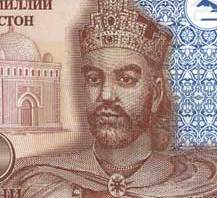Ismail Samani
| Isma'il ibn Ahmad | |
|---|---|
| Emir of the Samanid Empire | |

An image of Isma'il ibn Ahmad (Isma'il Somoni) on the 100 somoni banknote issued by the National Bank of Tajikistan.
|
|
| Reign | August 892 – November 907 |
| Predecessor | Nasr I |
| Successor | Ahmad ibn Isma'il |
| Born | 849 Farghana |
| Died | November, 907 Bukhara |
| Issue | Ahmad ibn Isma'il |
| Dynasty | Samanid |
| Father | Ahmad ibn Asad |
| Religion | Sunni Islam |
Abu Ibrahim Ismail ibn Ahmad (Persian: ابو ابراهیم اسماعیل بن احمد سامانی, d. November 907), better known as Isma'il ibn Ahmad, was the Samanid emir of Transoxiana (892–907) and Khorasan (900–907). His reign saw the emergence of the Samanids as a powerful force. He was the son of Ahmad ibn Asad and a descendant of Saman Khuda, the founder of the Samanid dynasty who renounced Zoroastrianism and embraced Islam.
During his brother Nasr's reign, Isma'il was sent to take control of Bukhara, which had been devastated by looting on the part of forces from Khwarezm. The citizens of the city welcomed Isma'il, seeing him as someone who could bring stability.
Soon afterwards, a disagreement over where tax money should be distributed caused a falling out between Nasr and Isma'il. A struggle ensued, in which Isma'il proved victorious. Although he took effective control of the state, he did not formally overthrow his brother, instead remaining in Bukhara. He did so because Nasr had been the one whom the Caliph had given the formal investiture of Transoxiana to; in the caliph's eyes, Nasr was the only legitimimate ruler of the region. Furthermore, the Saffarids of Sistan had claims on Transoxiana; the overthrow of Nasr would have given the Saffarids a pretext for invading. Isma'il therefore continued to formally recognize Nasr as ruler until the latter's death in August 892, at which point he officially took power.
Isma'il was active to the north and east, steadily spreading Samanid influence as well as solidifying his control over other areas including Kirman, Sistan and Kabul. Ismail was successful in establishing economic and commercial development and organized a powerful army. It was said that he made his capital Bukhara into one of Islam's most glorious cities, as Ismail attracted scholars, artists, and doctors of law into the region. The first translation of the Qur'an into Persian was completed during Samanid rule. Sunni theology greatly cultivated during Ismail's reign, as numerous mosques and madrassas were built.
...
Wikipedia
